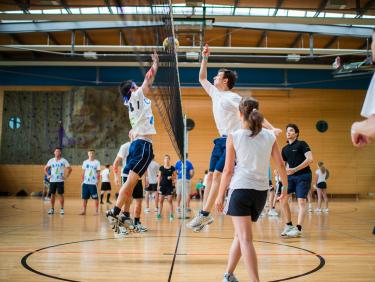Faculty of Behavioural and Cultural Studies Sport Science
Work with and for people is at the heart of sports science. Central topics are anchored in the areas of movement, games and sports, as well as school sports, amateur sport, high performance sports and sport for health purposes.
Sports science involves the coordination and integration of elements from different disciplines, or the development of original, interdisciplinary approaches to these fields. When it comes to school sports for example, sports scientists focus on how pupils can be educated through sport and the practice of sport, on how the health benefits of sports activities can be best achieved, and on institutional guidelines and requirements for teaching movement to groups. The study of amateur sport however, considers enjoyment through movement, health benefits and individuals’ ability to engage in sporting activities, the conditions for organised sport, dynamics and the stability of motivation to do sport, as well as the transformation of values relating to sport.

Special Features and Characteristics
The Institute of Sports and Sports Sciences (ISSW) is one of the most traditional and largest sports sciences facilities in Baden-Württemberg. It gets its special profile from its consistent emphasis on empirical research programmes, accentuation of knowledge transfer in research as well as a thematic focus on sports and exercise in all phases of life.
Research
Research at the ISSW takes place in three working areas:
- Exercise, training, and active ageing (motor control and learning processes throughout life; technique and condition training; biomechanical, motor, and performance physiology diagnostics; company health promotion; development, implementation, and evaluation of exercise offers for prevention and rehabilitation; etc.)
- Sports psychology (judging and decision-making in sports and in stressful situations; optimising judge and referee performance; social motivation and sports performance; psychology of intuition; self-regulation and mindfulness; etc.)
- Sports and education (childhood and youth research; school sports research; pedagogical aspects of high-performance sports; pedagogical potentials of sports in the course of life; etc.)
Professions
Various fields of sports sciences are open to graduates depending on the degree programme and study design. They include scientific, mediating, supervising, organising, and administrative activities at school (secondary school leading to university qualification), at clubs, associations and other facilities and companies in the fields of sports, sports sciences, health promotion, and (sports-related) business or the media. The Bachelor’s degree programme in sports sciences offers a degree qualifying graduates to enter a profession that enables transfer to a relevant Master’s degree programme. A subsequent Master of Education degree is required for the professional perspective “physical education teacher” at general or vocational schools.
Insights

Turn your passion into your career: I have always been interested in sports, and sports science will allow me to have a positive impact on health and education in the future.
Natalia Güllich, 24, Sports Science, 5th semester Bachelor


